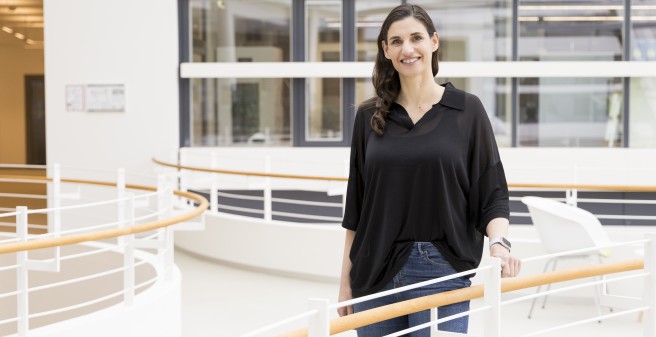Trailblazer from Haifa
When Prof. Dr. Meytal Landau arrived in Hamburg in 2019, the plan was to stay for only a year as a visiting scientist at the Center for Structural Systems Biology (CSSB). However, she fell in love with the city and, in 2023, accepted a permanent position at CSSB, as a W3 professor at the University Medical Center Hamburg-Eppendorf (UKE). Her research focuses on amyloids – a special group of protein fibers that are strongly suspected to be involved in the development of Alzheimer's disease.
Text: Nicole Sénégas-Wulf, Photo: Axel Kirchhof
Meytal Landau likes to go with her gut instinct when making decisions, even significant ones like moving from Haifa to Hamburg. “I try not to rack my brain over everything. If I want to do something. I just do it,“ says the scientist, who has already conducted research at universities in Tel Aviv, Jerusalem, and Los Angeles. When she was offered a position as a lead scientist with a UKE professorship at DESY in Bahrenfeld, she didn’t hesitate and moved to the Elbe with her daughter in summer of 2023. Only the German bureaucracy gave her a bit of a headache at first. “When you need a phone to open a bank account, but you need a bank account to get a phone, and you can’t sign a rental contract without having a bank account, you might find yourself in a quandary,“ she says with a dry laugh.
Fortunately, the 47 year old has a knack for solving tricky puzzles – especially those related to biology and medicine, like the effects of drugs on the body. “That certainly has to do with my personal history,” the scientist reveals. When she was 15, she was diagnosed with leukemia and spent all of her high school years in hospital. "During my two-year chemotherapy, I bombarded the doctors with questions. I wanted to understand everything about my treatment, but I hit a wall because my knowledge wasn’t sufficient yet," the scientist explains. Meytal Landau thankfully recovered, but the intensive therapy destroyed her left shoulder and both hips. "I could only walk independently again after artificial joints were implanted." After that, she took off professionally – starting with a pharmacology degree in Jerusalem, where she fell deeply in love with proteins during an elective course. "I was so fascinated by their unique structures that I went on to pursue a Master’s in Neurobiology and later earned a Ph.D.,” she says.
Landau isn't driven by a grand career plan. What motivates her is the search for answers, which led her to the CSSB at the DESY campus in Hamburg in 2023. “Here, I find the best conditions for my work,” she says. For several years, she has been studying amyloids –structures where proteins stick together to form stable fibers, which can be found, among other things, as biofilms in bacterial cultures. Amyloids are also linked to Alzheimer's disease. “They've been discovered in the brain cells of patients, where they form so called plaques. It's surprising that there's no apparent correlation between the amount of these protein deposits and the observed symptoms.” At DESY, she aims to delve deeper into this mystery. “Thanks to several high-performance microscopes and the PETRA III X-ray source right here on campus, we can precisely unravel the structure of amyloids,” she explains enthusiastically. She collaborates closely with the Medical Center Hamburg-Eppendorf (UKE) through various partnerships. In Alzheimer's research, for example, her team works with brain samples from the Department of Neurology. With the Institute for Medical Microbiology and Hygiene, she is researching antibiotic resistance in Staphylococcus bacteria. “At CSSB, we approach these problems from a structural perspective, while UKE focuses on genetic and clinical work. This way, we complement each other perfectly.”
Meytal Landau really appreciates her team in her new work environment. “It’s an incredibly dedicated group of eleven scientists, including many post-docs and PhD students, who are all committed to each other and to their respective projects,” she says enthusiastically. She is particularly passionate about mentoring young scientists. “Mentoring is extremely important to me. I love seeing these young people grow and helping them find their own path in science.”
And which paths has the researcher followed outside her lab? “Oh, all sorts of things,” she laughs. “Sometimes I’m a party animal, enjoying the nightlife in the Schanze, and other times I’m a nature enthusiast, strolling through Hamburg’s parks. For me, the city offers the perfect mix to explore all sides of my personality.” In quieter moments, Meytal Landau enjoys reading, especially books on philosophy or history. Like a seeker of answers, she is always on the hunt for insights – even to the deepest questions of life itself.
